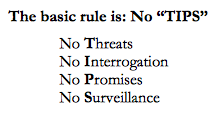Leaked Memo Reveals Harvard’s Strategy for Handling Graduate Student Unionization

Photo by Olga Khvan
In case you missed it, a group of Harvard graduate students are trying to unionize. Seeking a more centralized complaint system and greater leverage in negotiations with administration, the Harvard Graduate Student Union (HGSU) joined forces with the United Auto Workers Union, which represents graduate student unions at Columbia and New York University. And as the Crimson notes, the chapter the HGSU has partnered with, UAW Local 1596, has led successful the unionization of graduate students at UMass Boston and Lowell.
Unsurprisingly, Harvard administrators seem a smidge uneasy. An October 14 memo obtained by Jacobin magazine titled “[Graduate School of Arts and Sciences] Student Unionization Guide for Discussion” reveals administrators’ strategy for handling the unionization effort with respect to its faculty’s interactions with the student body.
“Please be sure to review these important guidelines carefully and particularly note that all information provided to students regarding the unionization effort must be factual, accurate, and free from any suggestion of threats or promises of future changes in benefits or working conditions,” the memo reads.
It begins by urging faculty to take a hands-off approach using the acronym “TIPS.”
 Faculty are advised against making explicit or implicit threats of adverse consequences for displaying union support, asking students for meeting times or the identity of the union campaign’s leaders, promising reward or future benefit for opposing the union, and eavesdropping on meetings or “[acting] as though you are trying to find out if students are participating in union activities.”
Faculty are advised against making explicit or implicit threats of adverse consequences for displaying union support, asking students for meeting times or the identity of the union campaign’s leaders, promising reward or future benefit for opposing the union, and eavesdropping on meetings or “[acting] as though you are trying to find out if students are participating in union activities.”
This all seems a bit odd coming from Harvard, an institution so renowned for its liberal sway that conservative bulwark William F. Buckley once said he’d rather live “in a society governed by the first two thousand names in the Boston telephone directory than in a society governed by the two thousand faculty members of Harvard University.”
Still, these reminders bode well for the fledgling unionization effort. “The use of fear and favor can be fatal to a union drive, and it’s good that at least some portion of the faculty is being told not to go there,” Jacobin‘s Corey Robin writes.
The “Do’s” section is where things get interesting. A sampling:
- Do Share the University’s Record on Stipends and Benefits, where known. Provide information to students about the array of benefits that they presently receive, including the University’s record of steady improvement over time—without a union.
- Do Explain the Disadvantages of Union Membership. There are economic costs to joining a union, including the likelihood that they will be required to pay annual dues. There are also non-economic costs, including the intrusion of a third party into an academic relationship, adding a new political entity (the UAW) with its own agenda to existing relations.
- Do Explain the Collective Bargaining Process. The process of collective bargaining requires parties to meet at reasonable times and places to discuss wages, hours, and working conditions. However, the law does not dictate what must go into a contract. Thus, the union cannot guarantee any specific outcome, such as an improvement in stipend or other benefits, as these matters would become subject to collective bargaining. If there is a recognized union of graduate students, the University would bargain in good faith, but the University cannot be forced to accept union demands. The University would also be allowed to propose its own changes to the status quo in negotiations. You can also mention that negotiations for a first contract usually take a year or longer during which time there could not be any unilateral changes to the status quo, including changes in compensation.
- Do Correct Inaccurate or Misleading Union Statements and Campaign Materials. Inform students of inaccuracies and provide the correct information, if known. Remind students that the union may make promises, but it cannot guarantee anything.
- Do Provide Information about the Union’s Record. Inform students about the union’s local, regional, and national track record representing graduate students, if you are aware of it.
You can read the memo here.


